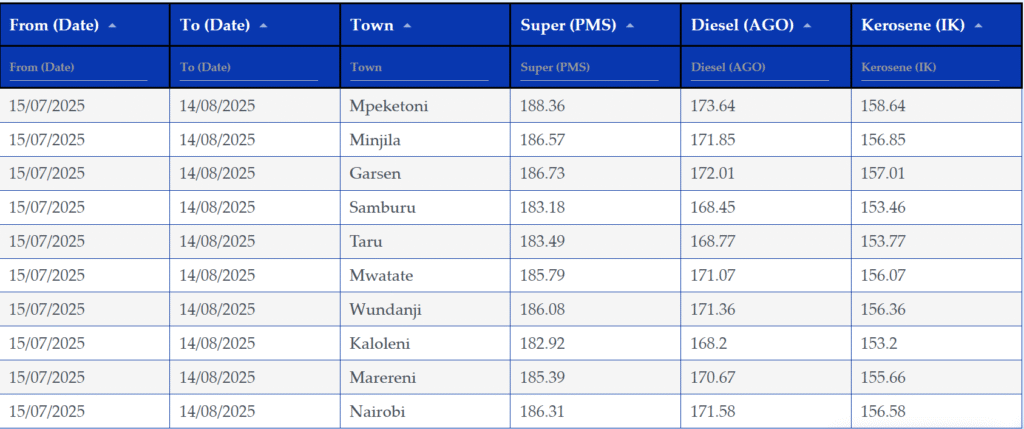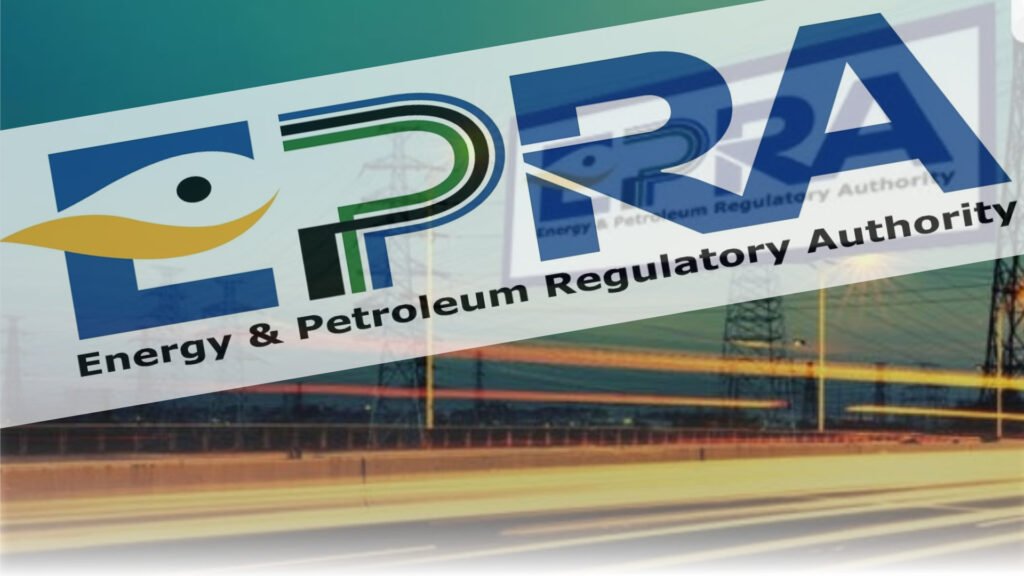Fuel is the lifeblood of any modern economy, and in Kenya, the Energy and Petroleum Regulatory Authority (EPRA) stands as the crucial custodian, ensuring stability, fairness, and sustainability in this critical sector. From the petrol in our cars to the heavy fuel oil powering industries, EPRA’s mandate touches every aspect of energy consumption in the nation. This blog post delves into the core purpose and functions of EPRA, with a particular focus on its influence on heavy fuel oil operations, and provides a snapshot of the latest fuel prices shaping the market from July 15, 2025, to August 14, 2025.
EPRA: The Guardian of Kenya’s Energy Sector
Established under the Energy Act, 2019, EPRA is the principal regulatory agency responsible for the economic and technical regulation of Kenya’s electricity, renewable energy, and petroleum sub-sectors. Its origins can be traced back to the Energy Regulatory Commission (ERC), which was instrumental in introducing fuel price controls in 2010 after a period of deregulation. This move aimed to protect consumers from price gouging by oil marketing companies and ensure a predictable supply of petroleum products.
EPRA’s overarching mission is to facilitate sustainability in the energy and petroleum sectors for improved livelihoods. This ambitious goal is achieved through a multi-faceted approach that includes:
- Licensing and Regulation: Granting licenses for various energy activities, from power generation and transmission to petroleum importation, storage, and distribution. This ensures that all players in the value chain adhere to established standards and regulations.
- Price Regulation: Calculating and publishing maximum retail prices for petroleum products, a function that has a direct and significant impact on daily life and industrial operations across Kenya.
- Quality Control: Monitoring the quality of petroleum products to protect consumers from adulterated or substandard fuels. EPRA conducts regular inspections and takes stringent action against non-compliant entities, as evidenced by recent shutdowns of fuel stations selling adulterated or high-sulfur diesel.
- Market Monitoring: Observing market trends, supply chains, and competition to identify and address any anti-competitive practices or inefficiencies.
- Consumer Protection: Safeguarding public interest by ensuring fair pricing, reliable supply, and adherence to safety and environmental standards.
- Data Collection and Analysis: Collecting and maintaining comprehensive energy data, which is vital for informed decision-making, policy formulation, and investment guidance within the sector.
EPRA’s Role in Heavy Fuel Oil Operations in Kenya
While much of the public’s attention on EPRA revolves around the retail prices of Super Petrol, Diesel, and Kerosene, its role in regulating heavy fuel oil (HFO) operations in Kenya is equally crucial, albeit less visible to the average consumer. HFO is primarily a residual product from crude oil refining, used extensively in industries for boilers, furnaces, kilns, and power generators. Its regulation by EPRA is fundamental to ensuring industrial stability, environmental compliance, and fair trade practices.
EPRA’s regulation of heavy fuel oil focuses on several key areas:
- Quality Specifications: EPRA, in conjunction with the Kenya Bureau of Standards (KEBS), sets stringent quality specifications for HFO. These parameters include kinematic viscosity, pour point, sulphur content, and net calorific value. Ensuring HFO meets these standards is critical for the efficiency and longevity of industrial machinery and for mitigating environmental pollution. For instance, the maximum sulphur content is a critical environmental consideration, given HFO’s higher sulphur levels compared to other refined fuels.
- Licensing of Importers, Distributors, and Storage Facilities: Any entity involved in the importation, distribution, or storage of heavy fuel oil in Kenya must be licensed by EPRA. This licensing process ensures that operators have the necessary infrastructure, technical capacity, and adhere to safety protocols, including those related to storage depots and transportation. The oversight here is vital for preventing spills, ensuring secure supply chains, and maintaining industrial safety.
- Trade Practices and Competition: While EPRA directly caps retail prices for PMS, AGO, and IK, the pricing of heavy fuel oil for industrial consumers operates on a slightly different model. HFO is typically sold in bulk through direct contracts between oil marketing companies and large industrial consumers. However, EPRA’s broader regulatory framework, which promotes fair competition and discourages monopolies, indirectly influences the HFO market. The recent Cabinet approval to consider importing heavy fuel oil and bitumen through a centrally coordinated bulk procurement system, similar to the Open Tender System for LPG, indicates a move towards potentially greater price transparency and competition in the HFO sector. This could lead to more predictable pricing and potentially lower costs for industries in Kenya.
- Compliance and Enforcement: EPRA conducts regular audits and inspections of HFO handling facilities and operations to ensure compliance with all regulations. Violations can lead to severe penalties, including fines and the revocation of licenses. This enforcement mechanism is critical for maintaining standards and protecting both economic interests and the environment.
The careful regulation of heavy fuel oil ensures that Kenyan industries have access to a reliable, quality-controlled, and responsibly sourced fuel. This, in turn, contributes to the overall economic stability and growth of the manufacturing and energy generation sectors in Kenya.
The Mechanics of Fuel Price Determination by EPRA
The process by which EPRA determines retail fuel prices in Kenya is a complex interplay of international market dynamics, local taxes, levies, and operational costs. The prices are calculated monthly, taking into account several components:
- Landed Cost: This is the most significant component and is determined by the global price of refined petroleum products (not crude oil), freight costs, insurance, and other logistical charges to bring the product to the port of Mombasa. Fluctuations in international crude oil prices and the strength of the Kenyan Shilling against the US Dollar directly impact this component.
- Taxes and Levies: The Kenyan government imposes various taxes and levies on petroleum products. These include:
- Value Added Tax (VAT): Currently at 16%, as per the Finance Act 2023.
- Excise Duty: Adjusted for inflation.
- Road Maintenance Levy: Contributes to infrastructure development.
- Petroleum Regulatory Levy: Funds EPRA’s operations.
- Petroleum Development Levy: Supports strategic petroleum stock and price stabilization.
- Import Declaration Fee (IDF) and Railway Development Levy (RDL).
- Oil Marketing Company (OMC) Margins: These are fixed payments set by EPRA to cover the costs incurred by oil marketing companies, including wholesale and retail margins. These margins account for expenses like bulk storage, transport, handling at depots, station operations, staffing, and utilities. Recent adjustments to these margins have been a point of public discussion, with concerns raised about their impact on the final pump price.
- Distribution Costs: This includes the cost of transporting fuel from Mombasa to various towns and regions across Kenya. This is why fuel prices vary significantly from Mombasa to inland towns.
EPRA’s Petroleum Pricing Regulations aim to ensure that all prudently incurred costs are recovered while striving to maintain reasonable prices for consumers. This delicate balancing act involves continuous review of the components and adjustments based on global and local economic factors.
Latest EPRA Fuel Prices: July 15, 2025 – August 14, 2025
The most recent EPRA fuel price review for the period of July 15, 2025, to August 14, 2025, reflects an upward adjustment, largely influenced by rising average landed costs of imported petroleum products and currency exchange rate pressures. This adjustment has a direct impact on transportation costs, industrial operations, and the overall cost of living in Kenya.
Here are the maximum retail prices in various towns:
| From (Date) | To (Date) | Town | Super (PMS) (KSh/Litre) | Diesel (AGO) (KSh/Litre) | Kerosene (IK) (KSh/Litre) |
| 15/07/2025 | 14/08/2025 | Mombasa | 183.02 | 168.31 | 153.29 |
| 15/07/2025 | 14/08/2025 | Kilifi | 183.88 | 169.16 | 154.16 |
| 15/07/2025 | 14/08/2025 | Likoni Mainland | 183.41 | 168.69 | 153.68 |
| 15/07/2025 | 14/08/2025 | Kwale | 183.41 | 168.69 | 153.68 |
| 15/07/2025 | 14/08/2025 | Malindi | 184.24 | 169.52 | 154.52 |
| 15/07/2025 | 14/08/2025 | Lungalunga | 184.27 | 169.55 | 154.55 |
| 15/07/2025 | 14/08/2025 | Voi | 185.21 | 170.49 | 155.49 |
| 15/07/2025 | 14/08/2025 | Taveta | 187.64 | 172.92 | 157.92 |
| 15/07/2025 | 14/08/2025 | Lamu | 188.36 | 173.64 | 158.64 |
| 15/07/2025 | 14/08/2025 | Hola | 188.85 | 174.13 | 159.13 |

(Note: Prices for Nairobi were reported as KSh 186.31 for Super Petrol, KSh 171.58 for Diesel, and KSh 156.58 for Kerosene for the same period, indicating slight variations from the coastal towns due to transportation costs.)
The increases, as explained by EPRA Director General Daniel Kiptoo, are primarily due to a rise in the average landed cost of imported fuel between May and June 2025. This underscores Kenya’s reliance on imported refined petroleum products and the susceptibility of local prices to international market volatility and currency fluctuations.
Challenges and the Road Ahead
EPRA faces continuous challenges in its mandate. Global geopolitical events, production cuts by oil-producing nations, and currency volatility directly impact the cost of fuel imports. Domestically, there is a constant balancing act between ensuring fair returns for oil marketing companies and protecting consumers from exorbitant prices. The high taxation component on fuel in Kenya remains a significant point of contention for many, often leading to calls for government intervention to cushion consumers.
Looking ahead, EPRA’s role will continue to evolve. Efforts to introduce structured importation systems for products like LPG and potentially heavy fuel oil could bring greater transparency and efficiency. Furthermore, as Kenya continues to explore and develop its own energy resources, EPRA will be central to establishing the regulatory frameworks that ensure sustainable and responsible extraction and utilization.
In conclusion, EPRA is more than just a price regulator; it is a fundamental pillar supporting Kenya’s economic stability and energy security. Its multifaceted functions, including the critical oversight of heavy fuel oil operations, ensure that the nation’s wheels keep turning, industries thrive, and households have access to essential energy resources, all while striving for a balanced and sustainable future.


DEMMIS